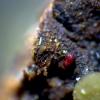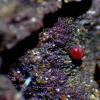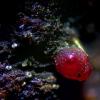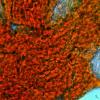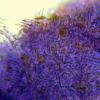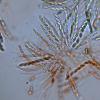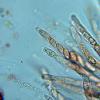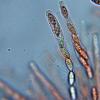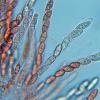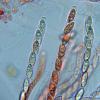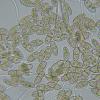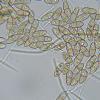
11-06-2022 08:59
Hola.Una aparente Nectriaceae compartiendo espacio

20-10-2014 13:27
 Yatsiuk Iryna
Yatsiuk Iryna
Hi there!Need help with this mysterious finding on

10-06-2022 17:21
Juuso ÄikäsThese Cyathiculas were growing on the same stem as

10-06-2022 20:06
 Riet van Oosten
Riet van Oosten
Hello, Found by Matthijs Molenaar on dead herbace

08-06-2022 22:05
herman lambertDoit-on tenir inclure les appendices dans la mesur

09-06-2022 14:41
Juuso ÄikäsI've seen this fungus many times before, and it se

09-06-2022 09:08
Thomas LæssøeStrange looking object all over the host with slig
Ayuna con una Nectriaceae
Josep Torres,
11-06-2022 08:59
Una aparente Nectriaceae compartiendo espacio con algunos ejemplares de Vibrissea flavovirens, aunque no creo que tenga ninguna relación con ella, sobre la superficie de un cono bastante degradado de Pinus mugo y semisumergido en agua limpia procedente del deshielo, en el Pirineo Catalán y a 1850 metros sobre el nivel del mar.
Muy diminutos peritecios, más o menos globosos con un mamelón en su parte alta, de un llamativo color rojo, brotando de manera dispersa y con un diámetro de tan solo entre 0,19 a 0,37 mm.
Pared del peritecio formado por hifas filamentosas fuertemente entrelazadas entre si, con abundante pigmento intracelular anaranjado que se vuelve violáceo con el KOH al 20%.
Ascos octospóricos, uniseriados con una longitud de entre 100 y 115 micras y una anchura de entre 6,2 a 7,9 micras.
Aparentemente no se observan paráfisis.
Ascosporas de pared aparentemente lisa, con un septo central en el que se observa un sutíl constreñimiento, y contenido granuloso en su interior con unas medidas de:
(13.7) 14.4 - 17 (17.4) × (5) 5.7 - 6.6 (6.9) µm
Q = (2.1) 2.3 - 2.8 (3.1) ; N = 36
Me = 15.7 × 6.2 µm ; Qe = 2.6
Soy plenamente consciente de la dificultad que representa el identificar estas especies sin disponer de una imágen de la sección del peritecio, punto que me ha sido del todo imposibe dado el muy pequeño tamaño de los ejemplares.
Cualquier opinión por vuestra parte será bien recibida.
Muchas grcaias de antemano.
Saludos cordiales.
Jacques Fournier,
11-06-2022 11:36

Re : Ayuna con una Nectriaceae
Hola Josep,
Se trata de una especie acuática que ya he encontrado pero que aún no tiene nombre. Al parecer, hay dos especies estrechamente relacionadas pero diferentes que conviven en la madera sumergida.
Saludos,
Jacques
Se trata de una especie acuática que ya he encontrado pero que aún no tiene nombre. Al parecer, hay dos especies estrechamente relacionadas pero diferentes que conviven en la madera sumergida.
Saludos,
Jacques
Josep Torres,
11-06-2022 14:22
Re : Ayuna con una Nectriaceae
Gracias Jacques, aunque no tenga nombre podríamos considerar que se trata de una Nectria sp., o ya se trataría de otro género distinto.
Saludos cordiales.
Saludos cordiales.

